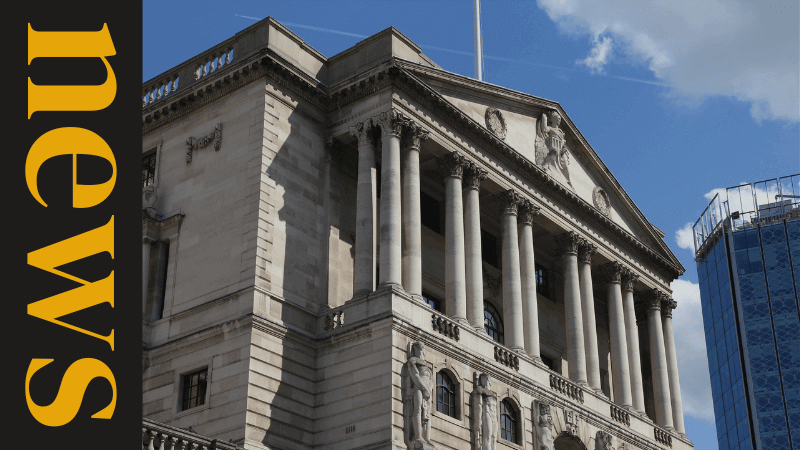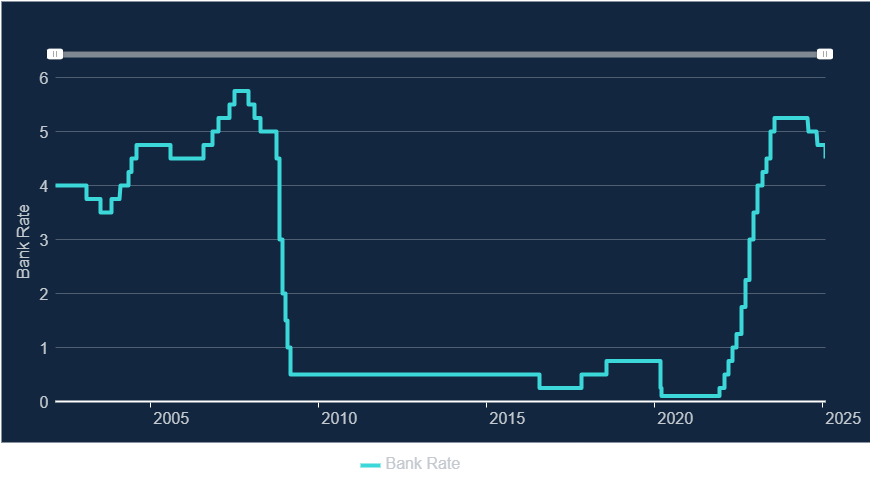Categories
BoE Lowers Base Rate to 4.25% | What it Means for Your Mortgage

The Bank of England has voted to lower the base rate at 4.25%, but could further cuts be on the horizon?
In February, the Bank of England voted to reduce the base rate to 4.5%, a reduction of 0.25%. In March, it's voted to keep it the same, and in May they've just dropped it again to 4.25%.
Mortgage borrowers on fixed-rate deals won't see any immediate changes, but those on trackers will see an instant effect.
In addition, 1.8 million fixed-rate mortgages are due to end in 2025, and while rates are certainly higher than they were 3-5 years ago, the latest drop will come as good news to many who are looking to remortgage.
At Clifton Private Finance, we've already seen multiple lenders reduce rates across a range of products in the lead up to and response to the base rate reduction, with many options now below 4%.
Here's a current snapshot (updated live):
And to get a free quote today:
Over the past two years, the Bank of England has taken a hawkish stance towards the base rate. But with inflation only slightly higher than the Bank of England's 2% target and a need to stimulate more economic growth, industry experts widely expected another cut.
The base rate is the main way that the Bank of England controls inflation, so if inflation rises significantly, it's likely the bank rate would be increased again - keep an eye on inflation figures if you want a better idea of where rates may be heading next.
In 2024, mortgage rates fluctuated in response to bouts of economic uncertainty sparked by the Autumn Budget, overseas elections and other geopolitical influences.
It’s unlikely that interest rates will return to the super-low levels we saw before 2022, but five-year fixes dropping consistently across the board is certainly a sign that there are more reductions to come.
In this article, our mortgage brokers weigh in on the discussion, and we analyse the bigger picture of the UK economy, inflation, and the mortgage market in this article.
See similar: Are Mortgage Rates Going Down?
Key Takeaways
- The Bank of England has reduced the base rate to 4.25% and mortgage rates are following.
- Homeowners on tracker mortgages will see immediate reductions in payments, and fixed-rate borrowers are likely to benefit when their terms expire.
- Lower mortgage rates could ease affordability concerns, helping first-time buyers enter the housing market.
- The government remains focused on economic growth, with policies aimed at stimulating investment and spending.
What Do Our Experts Say?

George Abouzolof
Senior Finance Broker CeMAP
The immediate impact of a 0.25% reduction will be a drop in mortgage payments for those on base rate trackers. Paying 0.25% less on a £1m interest-only mortgage equates to £2,500 less per year. So, the savings across the mortgage industry could be huge.
Fixed rates are unlikely to follow suit unless government bond yields relax - which they have done month-on-month. Most borrowers are opting for two-year fixes in the hope that rates will continue to drop in the future.
Relations with the US could pose a threat to the economy’s recovery. Trump is highly US-focused, and is prioritising American brands, as well as removing incentives for sustainable tech. This could make trade with US more difficult.
There are signs that US administration could go on a spending spree, which could also have a knock-on effect on us.
However, the overall sentiment has been much more neutral than we might have expected. While some landlords have been put off, for many, it’s business as usual. Investors are looking where they can to make a profit and overcome the current climate.
We’re still seeing a steady influx of first-time buyers and buy-to-lets, which could be a sign of the anticipated rush to purchase ahead of the upcoming stamp duty changes.
Furthermore, we haven’t seen a decrease in foreign investment so far, despite claims that the Autumn Budget would impact this.
Read blogs: Should You Get a Tracker or Fixed Rate Mortgage in 2024? & Is Now the Time to Switch?
The graph below shows how the bank rate has increased since mid-2021.

(Credit: Bank of England)
How Does Inflation Influence the Bank Rate?
The country is recovering from high inflation rates that led to an elevated cost of living in 2022. The Bank of England controls inflation primarily by adjusting the bank rate, which determines the cost of borrowing across the nation. Higher interest rates mean that borrowing is more expensive, which limits economic activity.
Reduced economic activity will typically cause inflation to fall. However, it's also important that inflation doesn't fall too low. If this does happen, people may put off spending en masse in hopes that prices will drop. When spending stops completely, whole systems and companies can come to a grinding halt.
The aim is to keep inflation low and stable.
How Did Inflation Get So High?
COVID-19 caused a shortage in products and services in 2020, and this demand led to increased prices. Then, Russia’s invasion of Ukraine impacted energy and food prices. Finally, it became evident in 2022 that thousands of people had left the workforce following the pandemic. This pushed up hiring costs, and many businesses subsequently raised their prices.
These three major hits to the economy contributed to the current cost-of-living crisis. Because major events have a relationship with inflation, the long-term view on inflation is never set in stone, but experts can make an educated guess with the data they do have.
Inflation is now close to the BoE's target of 2%, which many feel is the primary reason the bank has lowered interest rates.
Now that the base rate has been dropped again, many experts are confident that we'll see a slight uptick in inflation, but there may well be room for further base rate reductions in the future.
How Can You Find an Affordable Mortgage in 2024?
Despite the optimism about declining mortgage rates, deciding on the best option can be daunting and confusing.
We can help you compare mortgage products and their costs to find the best deal for your specific situation from a wide range of lenders nationwide.
Expert mortgage advisors have a finger on the pulse of the latest mortgage market news. Whether you're a first-time buyer, looking to refinance, or investing in a buy-to-let, we can help you understand your mortgage options so you feel confident you're making the right choice.
To see what we can do for you, call us at 0203 900 4322 or book an appointment below.









